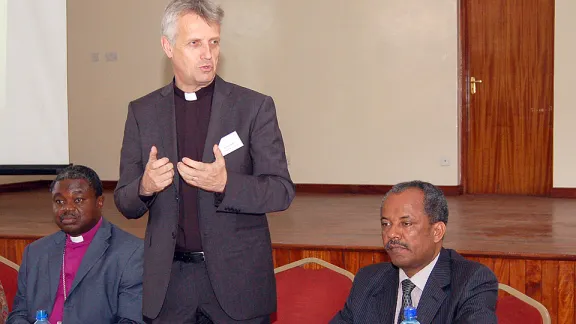
LWF General Secretary Rev. Martin Junge addresses the Africa Lutheran Church Leadership Consultation in Nairobi, Kenya. On the left, Presiding Bishop Dr Alex G. Malasusa, LWF Vice-President for Africa, and (right) Rev. Dr Wakseyoum Idosa, President of the Ethiopian Evangelical Church Mekane Yesus. © LWF/Fredrick Nzwili
LWF General Secretary Junge Commends African Churches' Action Plan against Poverty
The Lutheran World Federation ( LWF) General Secretary Rev. Martin Junge has commended African churches' relentless efforts to fight poverty and economic injustices in the continent, and encouraged them to learn from the many good practices across the Lutheran communion.
At the bi-annual Africa Lutheran Church Leadership Consultation (ALCLC), held 20-25 May, in the Kenyan capital Nairobi, Junge noted that "the problem of poverty today challenges the church leadership to respond not only through diaconal action, but to also advocate by talking to powers and governments to address issues of injustice, which are the root cause of poverty."
Junge's address to the heads of churches, women and youth leaders, and representatives of theological institutions from the 31 LWF member churches in Africa focused on church sustainability and Lutheran identity. The Evangelical Lutheran Church in Kenya and the Kenya Evangelical Lutheran Church jointly hosted the meeting attended by 65 participants under the theme "Towards a sustainable church: Africa regional expression remembering the past, embracing the present, and looking to the future." Citing good practices from a global communion perspective, the general secretary affirmed the "Youth for Eco-Justice" program co-led by LWF Youth, as a platform that supports initiatives that promote a sustainable environment and care for the creation. Young people express their "wish to leave the world in a better place than we found it…," he said, quoting Mike Langa Lulanga from the Evangelical Lutheran Church in Malawi, a participant in the eco-justice initiative.
Junge emphasized that the LWF is a strong communion as it moves forward to the 500th Reformation anniversary in 2017. He underlined the need to strengthen the theological identity and values of the Lutheran communion "in order live out our calling to holistic mission as we proclaim the gospel, serve the neighbor and advocate for justice in our fragmented world."
Environmental Stewardship and Food Security
Key at this year's ALCLC was the approval of an action plan developed by the LWF Task Force on Poverty (TFP). It defines specific strategies and activities that will strengthen churches' approaches as they seek to holistically transform local communities to achieve sustainable livelihoods.
The plan targets four key outputs: food security and environmental stewardship; institutional sustainability; gender justice; and leadership competence and good governance.
In its preliminary work from 2011, the TFP underlined that while numerous initiatives by churches and civil society, including partnerships with governments across Africa have moved entire communities from dependency to economic empowerment, more concerted was needed to address the root causes of poverty and injustice. Land, the group noted, is the main source of livelihood for the continent but food insecurity remains one of the major drivers of poverty.
According to the African Development Bank, the continent's economies grew by 4.7 percent in 2012, double the rate of the global economy. But, the consultation heard, this growth has not translated into tangible results on the ground, with huge sections of the population still lacking access to sustainable livelihoods, and services such as health and sanitation.
Access to Land
Presenting the action plan to the ALCLC, TFP member Ms Sibongile Baker, urged churches to speak out against land injustices on the continent. "What we have observed is that churches have stood by as governments appropriated land in one way or another, sometimes in good ways and not so good ways. We are asking for strong advocacy from the church," said the director of Lutheran Development Service, an associate program of the LWF Department for World Service in Zimbabwe.
The action plan will support African Lutheran churches in engaging their respective governments on access to land and its efficient use so that the poor and vulnerable can address food insecurity. As part of the churches' diaconal work, farmers will be linked to agricultural research and technological institutions for information to help improve food productivity. Equal opportunities will be promoted for youth and women by ensuring their representation and participation in church work and structures, as well as allocation of resources.
In his keynote speech, Presiding Bishop Dr Alex G. Malasusa of the Evangelical Lutheran Church in Tanzania (ELCT) and LWF Vice-President for Africa noted that in the 1970s "it was not foreseeable" that newly independent countries in Sub-Saharan Africa "would experience immense poverty and suffering" resulting from unjust social, political and economic institutions.
"I have a feeling we haven't been aggressive enough to come out with pragmatic theological discourses to address [these] challenges," said the LWF vice-president.
Address Unnecessary Church Conflicts
Malasusa welcomed the action plan and urged the Lutheran leaders to also address the "unnecessary conflicts especially at the church and diocesan levels where a lot of human and material resources are spent for mediation." He noted that many of these conflicts "are purely based on individual interests and not productive for God's mission." These are "signs of bad governance and lack of accountability in the churches," he added.
(By LWI correspondent Fredrick Nzwili)


